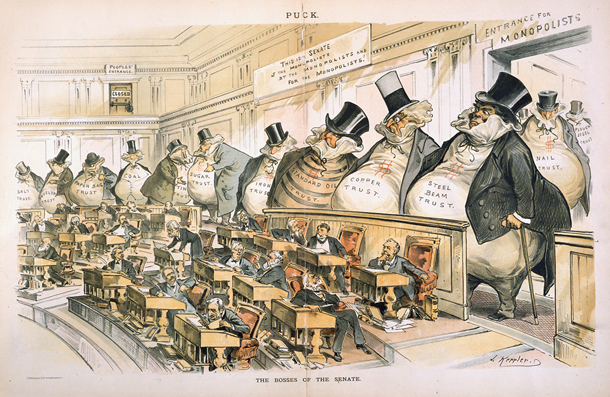The Progressives in Government
AP FOCUS: Progressives and “muckraker” writers attacked city corruption, corporate greed, poor living and working conditions, alcohol, and women’s right to vote. Each of these ills saw laws and/or Amendments passed to attempt to better the condition.
REVIEW: The Targets of Progressive Reformers (Optimism and possibility of improving society)
- Living and working conditions in the growing urban centers
- Transforming individuals – Indians (Dawes Act/Indian Schools and Immigrants/Settlement Houses)
- Racial Tensions and reactions to Jim Crow - Booker T Washington visits the White House
Ida Wells - Lynchings: Without Sanctuary Website PBS Jim Crow Interactive Lynching Map
- Labor issues - Child Labor, Women’s Labor
- Extended voting rights women: Suffrage Image and Suffrage Map
- Making government more responsive and less corrupt. This includes concern about concentrated power in government and the "organized corruption of the Boss system
City Reforms
Progressive reform began at the local or city level because it was easier to implement than at the vast state or national level. Urban corruption from political machines was a major focus, resulting in the reorganization of local government using the commissioner-and city-manager-styles of management.
State Reforms
Reform governors such as Theodore Roosevelt of New York, Robert LaFollete of Wisconsin, and Woodrow Wilson of New Jersey, all helped get reforms passed in their respective states. In addition, reforms first proposed by the Populist Party were enacted in order to make state governments more responsive to the needs of the people.
| Secret Ballot |
Privacy at the ballot box ensures that citizens can cast votes without party bosses knowing how they voted. |
| Initiative |
Allows 5% of voters to petition state legislatures in order to consider a bill desired by citizens. Connections - ballot intiatives |
| Referendum |
Allows voters to decide if a bill or proposed amendment should be passed. Connections - Ballston Facilities Referendum |
| Recall |
Allows voters to petition to have an elected representative removed from office. Connections - California Recall 2003 |
Direct
Primary |
Ensures that voters select candidates to run for office, rather than party bosses. |
| 17th Amendment |
In 1913 The 17th Amendment changed the way state chose their Senators. Instead of allowing the State Legislatures to choose the Senator, the candidate was chosen via a full state election, making the government more responsive. |

THE BOSSES of the SENATE
This frequently reproduced cartoon, long a staple of textbooks and studies of Congress, depicts corporate interests–from steel, copper, oil, iron, sugar, tin, and coal to paper bags, envelopes, and salt–as giant money bags looming over the tiny senators at their desks in the Chamber. Joseph Keppler drew the cartoon, which appeared in Puck on January 23, 1889, showing a door to the gallery, the "people’s entrance," bolted and barred. The galleries stand empty while the special interests have floor privileges, operating below the motto: "This is the Senate of the Monopolists by the Monopolists and for the Monopolists!" Keppler’s cartoon reflected the phenomenal growth of American industry in the 1880s, but also the disturbing trend toward concentration of industry to the point of monopoly, and its undue influence on politics. This popular perception contributed to Congress’s passage of the Sherman Anti-Trust Act in 1890.
Federal Reforms
During the Progressive Era, the Federal Government passed an enormous amount of legislation designed to conserve the environment, tighten past economic regulations, preserve the health and safety of American citizens, and generally provide needed capitalist reforms.
Newlands Reclamation Act
(1902) |
Encouraged conservation by allowing the building of dams and irrigations systems using money from the sale of public lands. |
Elkins Act
(1903) |
Outlawed the use of rebates by railroad officials or shippers. |
Pure Food and Drug Act
(1906/1911) |
Required that companies accurately label the ingredients contained in processed food items. |
Meat Inspection Act
(1906 |
In direct response to Upton Sinclair's The Jungle, this law required that meat processing plants be inspected to ensure the use of good meat and health-minded procedures. |
Hepburn Act
(1906) |
Strengthened the Interstate Commerce Commission, allowing it to set maximum railroad rates. |
Federal Reserve Act
(1913) |
Created 12 district Federal Reserve Banks, each able to issue new currency and loan member banks funds at the prime interest rate, as established by the Federal Reserve Board. |
Clayton Antitrust Act
(1914) |
Strengthened the Sherman Antitrust Act by outlawing the creation of a monopoly through any means, and stated that unions were not subject to antitrust legislation. |
Federal Trade Act
(1914) |
Established the Federal Trade Commission, charged with investigating unfair business practices including monopolistic activity and inaccurate product labeling. |
A wave of mergers among business put the issue of trust back on the table. What to do about business? How should trusts be regulated? TRUSTS – one business can control multiple businesses and become dominant in the economy
Comments (0)
You don't have permission to comment on this page.